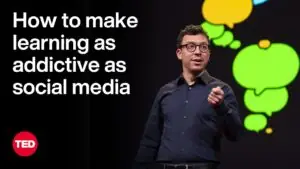Emotional and psychological aspects of language learning are just as fundamental as grammar and vocabulary drills. This may become an unexpected obstacle for some learners, taking the whole learning process off track. This is something that a Reddit user observes who’s struggling with their speaking skills in French. Despite being confident in reading and comprehending the language, the user feels discouraged when it comes to speaking. We will explore this common phenomenon among language learners, analyze the experiences and advice shared by other learners, and offer practical tips for overcoming this hurdle.

✅ AI Essay Writer ✅ AI Detector ✅ Plagchecker ✅ Paraphraser
✅ Summarizer ✅ Citation Generator
Key Takeaways:
- Language learning is a marathon, not a sprint.
- Receptive skills often develop faster than productive skills.
- Mental and emotional aspects are significant in language learning.
- Consistent practice and immersion are key to improvement.
The Complex Path to Fluency
Learning a new language is often romanticized in marketing materials as a swift and effortless journey. However, the reality is akin to mastering a musical instrument: it’s much easier to recognize notes on sheet music, but picking guitar and playing “Tin Pan Alley” as Stevie Ray Vaughn did requires consistent practice over months.
People face different challenges while learning a foreign language based on their native language, learning environment, and personal strengths and weaknesses. For some, grasping the grammar might be the hardest part, while others might struggle with building a substantial vocabulary. However, a common thread that runs through the experiences of most language learners, regardless of their background, is the challenge of improving speaking skills.
Developing speaking skills in a new language is probably the most challenging aspect of language learning, and there are several reasons why this is the case.
To begin with, speaking requires real-time language processing, which means learners must quickly recall vocabulary, apply the correct grammar rules, and produce the correct pronunciation, all while processing what the other person is saying. This demands a high level of fluency and mental agility developed through extensive practice.
Second, speaking is a highly interactive and dynamic skill. Unlike reading or writing, where learners can take their time to understand or construct sentences, speaking involves immediate and spontaneous exchanges, leaving little room for pausing to think or consult a dictionary.
Third, many learners experience anxiety about making mistakes in front of others, which can create a significant psychological barrier to speaking practice. This fear of embarrassment or judgment can lead people to avoid talking situations, thereby limiting their opportunities for practice and improvement. Additionally, finding a suitable environment or partner for consistent speaking practice can be challenging, especially for those who are not in a country where the target language is spoken. Speaking also involves mastering a language’s correct intonation and rhythm, which can be particularly tricky and is often quite different from the learner’s native language patterns.
A Reddit User’s French Learning Saga
The post’s author seems to have become an embodiment of all those issues. In the summer, our user set out to master French. With a background in reading French from a university course taken years ago, they were not a complete novice when they decided to dive back into the language this summer. The start was promising:
“I had tested my listening skills on TV5 Monde and apparently I was B1 level at the start of June.”
They threw themselves into the French language with enthusiasm, consuming all sorts of native-level content: documentaries with French subtitles playing in the background as they cooked dinner and evenings spent slowly journeying through French short stories, savoring each sentence. They even enrolled in classes on iTalki, using an A1 textbook with their teacher, a clear sign of commitment. “I’ve been able to throw myself into the language this summer,” they write, painting a picture of a dedicated and passionate student.
But amidst this vibrant tableau of language immersion, a shadow looms. Despite their progress and the joy they found in their studies, there was a nagging feeling that wouldn’t let go. The author confessed,
“There is a part of me that just feels like maybe I’m making a fool of myself and my teacher is laughing at me.”
This admission lays bare a vulnerability that is deeply relatable. They can follow “70 to 90% of an art documentary with French subs,” yet they are haunted by the struggle to talk about a hypothetical holiday to the south of France in class.
“There is a part of me that just feels like maybe I’m making a fool of myself and my teacher is laughing at me.”
This admission lays bare a vulnerability that is deeply relatable. They can follow “70 to 90% of an art documentary with French subs,” yet they are haunted by the struggle to talk about a hypothetical holiday to the south of France in class.
“I can’t be who I am in English,” they confess. It’s a cry that rings true with many language learners: a longing to express themselves in another language and frustration when they can’t come out right.
This Reddit user’s story is a vivid illustration of a journey that is at once exhilarating and exasperating, a dance of progress and setbacks that anyone who has tried to learn a new language knows all too well.
Peer Response from the Language Learning Community
The Reddit community’s response to this post should serve as a source of solace and renewed energy for the author in his struggle with French. In the comments section below the post, numerous compassionate individuals have quickly offered their reassurances and shared their experiences with the author.
The mental components of language learning were emphasized by several commenters advising focusing on progress rather than perfection. They suggest a mental reframing exercise, encouraging the author to consider their learning achievements.
“If these feelings are really getting to you, then spend some time trying to mentally reframe and focus on how much you can do with the language. There are huge mental components to learning a new language, and it is not really productive to get too caught up in the more negative loops.”
This is especially sensitive issue for the author, who, despite being able to understand a significant portion of a French documentary, feels discouraged when speaking. It’s a call to shift the perspective from what is lacking to what has been achieved and to move on from there.
Daily improvement and immersion in seeking moments of brilliance were also encouraged by a user who claims to speak multiple languages.

They offer a unique perspective on the intricacies of French pronunciation, attributing its complexity to historical linguistic developments and encouraging the author to practice speaking with those less proficient in English, thereby creating a more equal, less intimidating language exchange.
“As long as you are improving everyday, you are doing well. It’s more about consistency and immersion than strokes of genius. Speaking French is hard because Gaelic people could not use the limited Latin characters for saying what they wanted to say. Hence, they created a lot of silent characters. However, you will be able to pronounce well with practice. Try to find folk who are bad at english and speak out French words to them.”
A recurring theme in the comments is the idea of “progress, not perfection.” Commenters share strategies for revisiting material they struggled with six months ago to realize and appreciate the progress they have made. This mirrors a study by the University of California, which found that self-assessment and reflection are critical in language learning. It’s a strategy that could help our Reddit user to see their journey in a new light, recognizing that learning is a process and that they have indeed come a long way.
In summary, the comments from fellow language learners offer a wealth of empathy and useful advice. They emphasize the importance of mental framing, encouraging a focus on progress rather than perfection and highlighting the often subconscious nature of language acquisition. The comments dispel fears of judgment from teachers, reminding learners that educators are allies in the journey towards fluency. A common theme is the long-term nature of language learning, likened to a marathon rather than a sprint, and the value of consistent, patient effort. These insights collectively serve as a virtual support group, offering practical strategies, emotional comfort, and fellowship, which are invaluable in the often challenging language learning journey.
Best Practices to Address a Language Learning Concern
As discussed earlier, the insightful comments from fellow language learners are not just words of encouragement. They are grounded in established best practices of foreign language learning. These tried and true methods, recommended by linguists and language teachers worldwide, are the backbone of effective language acquisition. They are the reason why the advice from experienced learners has such resonance and why these strategies work. Below is a table of some of these best practices, along with explanations of how they contribute to successful language learning:
| Regular Conversation Practice | Engaging in regular conversations with a native speaker, such as a language exchange partner or a tutor on platforms like iTalki or Preply, provides a safe space to make mistakes, receive corrections, and gradually build confidence. |
| Targeted Speaking Exercises | Recording oneself speaking in the target language and playing it back allows for self-assessment of pronunciation, rhythm, and intonation. This practice, while perhaps uncomfortable at first, can lead to significant improvements over time. |
| Adopting a Growth Mindset | Viewing challenges and mistakes not as failures, but as opportunities for growth and learning is key. This mindset encourages patience and resilience, essential traits in language learning. |
| Language Immersion | Immersion, such as consuming media in the target language or setting one’s phone and social media to that language, exposes learners to authentic language use. This constant exposure improves comprehension and helps learners think directly in the target language, a critical step towards fluent speaking. |
| Setting Realistic and Achievable Goals | Instead of aiming for rapid progress to a specific language level, setting smaller, more immediate goals makes the process feel more manageable and rewarding. Celebrating these small victories along the way can provide the motivation needed to continue the journey towards fluency. |
While the path to language fluency is undoubtedly challenging, it is also deeply rewarding and enriching adventure. By adopting these best practices, learners like our Reddit user can steadily progress towards their language goals, turning the dream of fluent communication into a fulfilling reality. These practices, grounded in both professional expertise and the lived experiences of language learners, offer a practical and encouraging roadmap for anyone on the journey towards language mastery.
Follow us on Reddit for more insights and updates.





Comments (0)
Welcome to A*Help comments!
We’re all about debate and discussion at A*Help.
We value the diverse opinions of users, so you may find points of view that you don’t agree with. And that’s cool. However, there are certain things we’re not OK with: attempts to manipulate our data in any way, for example, or the posting of discriminative, offensive, hateful, or disparaging material.